Changing the data market business model from buying and selling of your data to buying and selling the “use” of your data.
Current advertising data market industry involves selling and buying of data. Regardless of the type of data the advertisers are looking for, it’s all about collecting the data from various means, categorizing it, perhaps pseudo anonymizing it and selling the data to advertisers. And data, as it turns out, is a very lucrative business. The global market size of the advertising market is estimated to be US$600–800 billion and the internet makes up about half of that size.
You probably have heard this statement before. If it is free, you are probably the product being sold. And this is a very common way for the data market players to create a “free” application that allows the collection of data that the market players will buy and sell. The more accurate the data, the more valuable. Google, Facebook, Twitter, Microsoft, etc all use similar business models. But there are other players in this market, some you may have heard of in the news (Cambridge Analytics for example) or smaller companies that trade your data under the covers. They will collect from various sources, reshuffle, and resell the data to others.
But as with any business model, there are challenges and the data market is not without its share of issues.
Partisia Blockchain’s privacy first blockchain with research lead secure multiparty computation (sMPC) can help solve these issues and also provide data market participants with alternate business models that can bridge the gap between consumer privacy concerns and better data overall.
This changes the data market business model from buying and selling of your data to buying and selling the use of your data. By shifting the paradigm to a services model, new potential revenue streams become available while being able to solve some of the difficult challenges facing the advertising industry.
Projects like Blockchain-Ads and Kin are already looking to take advantage of this new model and we are exited to see where this will lead in the future.
Connect with us at build@partisiablockchain.com to see how we can help you create new business models, solve challenges and provide new incentives for the users to use your system.
Website • Twitter • Discord • Telegram • LinkedIn • Facebook • Instagram • GitLab • Medium • YouTube
Throughout the ages, famous philosophers have grappled with the concept of good governance. From Aristotle, Machiavelli, and Hobbes to Rousseau, Voltaire and Rawls, different perspectives have existed and challenged each other over the ages on the topic. Today, in democratic societies at least, the general consensus is that of a government that is accountable to the people, with checks and balances, the guarantees of fundamental rights, and integrity in how it operates. New technologies, such as blockchain, can aid in the pursuit of good governance — this article outlines a few possible examples of how Partisia Blockchain could help governments innovate and better their governance practices:
Paperwork, licenses and standing in lines — bureaucracy is something that regardless of political affiliation, people love to hate. But the true purpose of bureaucracy (whether well-designed or not) is to ensure due process and guarantee people’s rights. This in essence very noble pursuit can run into a variety of different problems, from potential inefficiency to outright corruption. A public blockchain could help to streamline processes and make them more transparent, paperwork can be filed and traced through different steps on the blockchain, whereas combined with MPC the private information in these processes can be kept secret, or only available to certain parties. In certain countries, where corruption is an issue, the intransparency of bureaucracies can allow for wrongdoing in e.g. bureaucratic processes such as ignoring, changing and/or the outright fabrication of documents. A public blockchain could allow for more trust in bureaucratic institutions, especially if those institutions don’t have control over the nodes that operate the blockchain. This is the principle behind a project called DelNorte.
DelNorte is currently running pilot projects in Latin America creating NFTs out of real estate deeds and adding them to a public blockchain. This is meant to make the bureaucratic process more efficient, give more stability and transparency regarding real estate ownership in the participating countries, circumvent potential corruption and maintain the integrity of the institution. While the government is the door to access to the system, the government does not have control over the blockchain and the listed real estate deed NFTs. Partisia Blockchain is proud to have entered into a partnership with DelNorte, helping them to add privacy and security to their e-government solutions.
Governments provide goods and services to their citizens, from parks, highways and schools to militaries for the national defense. While some governments have more resources than others, many of the goods used to e.g., build and maintain a public highway, need to be contracted to third parties. What is usually the case when a government has to contract such goods or services out, is that they publish a tender for which parties can bid. This ideally leads to many different companies bidding for the contract with the government, attempting to underbid each other and/or outclass each other with the quality of the good/service that they provide.
Nonetheless, public procurement bidding processes are often highly intransparent and even prone to corruption, which cheat the taxpayers out of the best possible deal they could have had. Blockchain technology could also help combat this problem, making the bidding process transparent and establishing trust with the general public. However, a major issue with the transparency of a public blockchain is that it does not allow for the hiding of certain sensitive information e.g., a company’s capabilities, classified technology, etc. that could be part of the bidding process. This is where E-Trusty comes in: E-Trusty is a dApp building on Partisia Blockchain to use the public blockchain to create transparency, while obfuscating sensitive information in the bidding process using MPC. The goal is to create a platform for public procurement that allows for the transparency of seeing multiple bids for a given contract, while using MPC to hide and protect sensitive information.
Multiple central banks around the world are beginning to develop and implement so-called central bank digital currencies (CBDCs). As opposed to digital currencies, such as Bitcoin or Ethereum, these digital currencies are centralized and issued by a national bank. They are pegged to the value of a fiat currency and are meant to be a part of the existing financial system. There is however a major concern regarding CBDCs and that is that due to their centralized structure and control, they could essentially allow for a central bank, and by extension a government, to have complete insight into how people are spending their digital money. Furthermore, it is also feasible to imagine that a government could easily overreach, especially if it were to become corrupt, and easily seize such digital money. There would therefore need to be checks and balances guaranteed in the application of a CBDC. One solution for this problem, could be to use MPC to make the settlements of such a CBDC private. Such a system could also be designed to allow for certain transparency towards a government entity with the sufficient legal justification such as a warrant. The CBDCs settlements would be intransparent to e.g. the national bank or the government, however a court could allow for access to certain transaction data for a judicial institution.
In many places across the world, trust in elections is waning: the intransparency of voting systems, combined with distrust fueled by political rhetoric are a major threat to the integrity of democracies today. The recent coup in Bolivia or the storming of the U.S. Capitol have shown that even an unsubstantiated claim of fraud in an election can lead to political violence or even the overturning of a democratically elected government. E-voting, and particularly blockchain-based e-voting solutions, have attempted to solve this issue. They have however run into a variety of problems: intransparency or too much transparency, hardware and/or software vulnerabilities, among many others. Nonetheless, Partisia Blockchain’s MPC technology could help in solving many of these issues. MPC could be used to assure the privacy of a voter’s ballot, while showing votes being tallied for specific candidates in real-time. The election results could be publicly auditable and contestable and voters could be able to track their own votes. This kind of solution could in theory ensure safe, transparent and auditable elections, while keeping people’s votes secret.
Partisia Blockchain Foundation is dedicated to facilitating innovative solutions to real-life problems. Democratic innovation is one of the fields we are proud to contribute to.
Please contact us, if you have any questions about how our technology could enable better governance or if you think your organization could benefit from our technology.
Contact information: build@partisiablockchain.com
Website • Twitter • Discord • Telegram • LinkedIn • Facebook • Instagram • GitLab • Medium • YouTube
In 2018, the European Union’s General Data Protection Regulation (GDPR) came into effect, causing a wave of changes to terms and conditions in your favorite applications across the globe. GDPR aims to increase people’s control and rights over their own personal information and heavily penalizes companies that infringe on these rights. Infringing on the rights of EU citizens laid out in GDPR could result in a fine of €20 million or 4% of the annual global turnover of an enterprise, so compliance is strongly incentivized. This new regulation is widely considered a major turning point in data protection and privacy rights, starting a policy diffusion of similar data protection laws across the globe. GDPR is law in every member country of the European Union and establishes a “single data market” within the EEA. Similar regulations have also been adopted in California, Chile, Japan, South Africa, Argentina, Turkey and Brazil, among others.
GDPR (as well as many of the similar regulations) involves multiple core tenets, among others setting out the principles for which personal data can be used and processed. Lawful purposes of the use of personal data and the digital rights that citizens have over their personal data. While there are many different compliance aspects of data protection regulations, such as GDPR, here are a few examples of how our technology could help your organization stay compliant:
GDPR requires organizations processing personal data to transform the data in such a way that it cannot be connected to the person it was collected from (pseudonymization). Partisia Blockchain could help an enterprise disassociate a person from their (encrypted) data, assuring such pseudonymization through the use of multiparty computation (MPC) technology. This pseudonymization can also be done in a way to allow for continuous collection of data from the same individual, if required for e.g. a longer-term study.
Furthermore, the concept of MPC also can also aid in maintaining an individual’s control over their data, as e.g. the concept of MPC secret sharing can allow for useful outputs being generated without compromising the underlying data (see Multiparty computation: The beacon of privacy solutions explained). MPC (especially combined with a blockchain) can also therefore increase the security of personal data, as the data and calculations are all run in a decentralized fashion by nodes that are all independent from each other. Partisia Blockchain’s nodes and their operators are all independent, run independent systems and have been vetted for cybersecurity by Partisia Blockchain experts.
Another right laid out by GDPR is the so-called right of access. This is the right of people to be able to see how their data is being processed and with whom it is being shared. The ledger kept on a blockchain could help an organization provide an immutable record to ensure this right. For the same reason, the blockchain could help organizations provide the record of processing activities required for GDPR-compliance under certain circumstances as well. As opposed to some other blockchains, Partisia Blockchain also allows for the possibility of private data to be removed from the record. Essentially meaning that data entered into the blockchain can be erased later on, allowing for compliance with GDPR’s right of erasure (the right for people to have their personal data removed from a database).
Lastly, the geographical location of servers used to process personal data could sometimes mean the difference between compliance and a criminal offense. Partisia Blockchain’s jurisdiction management v1.0 allows organizations’ developers to specify the geographic location of nodes to be used in calculating personal data. This could for example allow for private data from the EU to only be sent to EU-based nodes, ensuring that the integrity of the single data market and the data rights of EU-citizens are not breached.
Partisia Blockchain is committed to empowering others in solving real-world problems using our cutting-edge technology. Data rights and data privacy challenges are two of these problems.
Please contact us, if you have any questions about how our technology could enable data privacy or think we can help your organization in improving its data protection architecture.
Contact information: build@partisiablockchain.com
Website • Twitter • Discord • Telegram • LinkedIn • Facebook • Instagram • GitLab • Medium • YouTube
July has brought remarkable progress and achievements to Partisia Blockchain! We are thrilled to share the latest developments in our dynamic ecosystem. In July, we unveiled our Grants Program for the second half of 2023, empowering visionary builders in the blockchain space with up to 3 million $MPC tokens. These pioneering teams will have access to cutting-edge technology and infrastructure, unlocking new possibilities in decentralized applications. Our commitment to driving innovation goes beyond financial aid — we empower those who challenge the status quo. Join us as we explore the exciting developments in our ecosystem, reflect on our impactful presence at EthCC, and delve into the tech highlights that pave the way for a more robust and user-friendly Partisia Blockchain.
Partisia Blockchain Foundation was thrilled to reveal our Grants Program for the second half of 2023, offering up to 3 million $MPC tokens (valued at US$1.2 million as of today) to pioneering builders in the blockchain space. We are seeking teams determined to create unique solutions that surpass current blockchain limitations. With our support, these projects will have access to cutting-edge technology and infrastructure to bring their groundbreaking ideas to life, addressing challenges previously considered impossible on other chains. Our commitment to driving innovation extends beyond financial aid, as we commit to empower teams that stand out and revolutionize the possibilities of decentralized applications. You can check out our value proposition and read the grant guidelines to apply now!
The Partisia Blockchain team was also thrilled to participate in EthCC conference in Paris in July, where we celebrated collaboration, strengthened partnerships, and reconnected with blockchain friends. Thanks to EthCC for providing a valuable platform for us to showcase our innovative technology, enabling secure collaboration while preserving privacy through advanced Multiparty Computation (MPC). We hope to see more of you next year.
As adoption is one of the main focuses for us, we kicked off a new adoptions team creation with a meeting in Aarhus. All the adoption officers were brought together to align on our strategy and goals for this year. Some of the key areas we agreed to focus on were in metrics, (number of leads from various sources, percentage of conversion, effective marketing campaigns, etc) to understand better where we are doing well and where we need to improve on.
Talking about adoptions, we are also happy to introduce another amazing project that has signed on to build on Partisia Blockchain. Veric is a credential and asset oracle running on Harmony One and they will begin to integrate Partisia Blockchain’s privacy technology to add additional functionality to their application. By adding the privacy layer, they aim to privatize details of their assets that they are looking to use for payment.
We were also honored to participate in this year’s University of Geneva “SDG Summer School”. The focus this year was “Open Source Health Solutions” and students from across the world met during three weeks on the ground and online. We had the pleasure of coaching a group of young minds looking to solve a technological problem for a healthcare company. The innovative solution the students came up with uses MPC and blockchain technologies and could have a positive impact on women’s health.
In line with our Ecosystem Focus, we were excited to showcase SecondLane, a groundbreaking project co-founded by key players in the Web3 OTC market. Offering advanced technology and licensing expertise, SecondLane is building on Weezi empowers project teams, advisors, and investors to unlock liquidity for unvested tokens and equity, while also facilitating the discovery and trading of illiquid digital assets. Explore SecondLane’s unique features in our guest blog, and join us for an insightful Q&A discussion with Oleg Ivanov, Co-Founder of Weezi/SecondLane, to gain exclusive insights into the platform.
As we reflect on the exciting developments in July, Partisia Blockchain has been busy pushing the boundaries of our technology and infrastructure. Here are some of the key highlights from our roadmap.
With these exciting developments, we are paving the way for a more robust and user-friendly Partisia Blockchain. As we move forward, our team is eager to reveal more groundbreaking tech updates next month. Thanks again to our community and your continued support!
Website • Twitter • Discord • Telegram • LinkedIn • Facebook • Instagram • GitLab • Medium • YouTube
The first half of 2023 has been an exciting time for Partisia Blockchain. We have achieved significant milestones and made remarkable progress in the Web3 space. As we look back on the exciting developments, we are thrilled to share our progress with our community and ecosystem partners. We integrated the BNB token into our ecosystem, launched our pricing oracle, explored the synergy between blockchain and sustainability and much more. For an overview of our accomplishments, we invite you to watch our First Half 2023 video review, where our founders give an update on the highlights and progress we have made.
The Partisia Blockchain team had the privilege of attending the renowned Crypto Valley Conference in Rotkreuz in early June. This gathering in our home canton of Zug brought together a diverse range of stakeholders, including our community, esteemed partners, and industry experts. We engaged in insightful discussions centered around emerging trends such as artificial intelligence and privacy.
Last month, our team members gathered in Copenhagen for a strategy meeting to collaborate, strategize, and plan for the rest of 2023. This meeting played a crucial role in bringing us together, aligning our goals, and fueling our drive for excellence in the upcoming months. Our founders also held a successful Quarterly Ask-Me-Anything (AMA) session with our community, where we provided updates on our accomplishments during the first half of the year and the plans ahead. The AMA was a demonstration of our commitment to fostering open communication and collaboration within our growing ecosystem.
June was full of major milestone achievements, with the BNB token now part of the BYOC family. This opens up both additional opportunities for the BNB community into our ecosystem as well as enabling the BNB dApps with our multiparty computation technology. As a part of the implementation, Bruce Ahn, our head of developer relations joined Binance in their AMA to describe what the integration is all about.
We also launched our long awaited pricing oracle for both ETH and BNB tokens. This will allow accurate pricing information for when ETH or BNB tokens are spent as gas in our chain.
The Partisia Blockchain community has been buzzing with excitement and activity, with various initiatives and partnerships making significant strides in the Web3 space. Let’s take a closer look at some of the major achievements and updates from our ecosystem partners.
Kin, the ad free Web3 search engine, kicked off a highly successful airdrop campaign in June. The campaign has been nothing short of remarkable, allowing Kin to reach a wide audience and introduce our project to Web3 enthusiasts around the globe. We are thrilled to see the tremendous growth in the Kin community and excited for what is next.
Another noteworthy achievement comes from Blockchain-Ads, a revolutionary advertising and data solution in the Web3 space. They have successfully deployed their groundbreaking product, the “Web3Cookie,” on the Partisia Blockchain testnet. This innovative data monetization tool empowers everyday internet users, enabling them to generate their own cookie and securely monetize their browsing data while preserving their privacy.
In addition to these achievements, we recently hosted our first exciting livestream on Parti.com, the first Web3 Peer-to-Peer creator economy platform. Brian Gallagher, the Co-Founder of Partisia Blockchain, took the stage and shared his insights into various topics. The livestream covered the BNB token bridge integration, zero knowledge, and decentralized social media. It was an opportunity for the community to gain valuable knowledge and test out the new Parti.com platform.
We were also delighted to announce the commencement of the on-chain distribution of rewards for the fourth quarter (March–May 2023). This quarter’s distribution is our largest to date, with a total of 1,202,224 MPC tokens being paid out to 743 wallets. The progressive nature of the rewards ensures that each quarter brings new opportunities for participants. If you are new to staking, we recommend checking out our guide and instructional video to learn how to stake and get rewarded.
In our ongoing commitment to innovation, Partisia Blockchain continued to shine a spotlight on our Interoperability and Scalability solutions. We explored the potential of our Interoperability solution, which enables seamless collaboration between chains, unlocking endless possibilities. Through the power of Bring Your Own Coin (BYOC), we revolutionize the way transactions are conducted across different chains. To learn more about our Interoperability solution, we invite you to read our article on the challenges in blockchain interoperability and Partisia Blockchain’s solution. Additionally, we hosted an informative Q&A discussion, where our expert team members provided valuable insights.
When it comes to scalability, we ventured into the future of blockchain scalability with our Complete Sharding solution. This cutting-edge solution harnesses the power of real-time finalization and genuine parallel processing of blocks, resulting in remarkable scalability. To gain a deeper understanding of what sets our Complete Sharding solution apart, we encouraged readers to dive into our detailed article and watch our insightful Q&A discussion.
Recognizing the significance of sustainability in the blockchain space, this month, we delved into the impact and importance of sustainable practices. We explored how blockchain technology promotes transparency, accountability, and sustainable practices, highlighting the unique approach of Partisia Blockchain. In a captivating Q&A session, we engaged with Monadi, a platform that manages sustainability data and reporting in compliance with the Corporate Sustainability Reporting Directive (CSRD). Together, we explored the intersection of sustainability, Environmental, Social, and Governance (ESG) factors, and the UN’s Sustainable Development Goals (SDGs). The discussion shed light on how Monadi, powered by Partisia Blockchain, plans to incorporate these principles into its future sustainability initiatives.
Website • Twitter • Discord • Telegram • LinkedIn • Facebook • Instagram • GitLab • Medium • YouTube
In the rapidly changing world of blockchain technology, sustainability has emerged as a fundamental driver, shaping the development and implementation of solutions. Environmental, Social, and Governance (ESG) principles — together with the United Nations’ Sustainable Development Goals (SDGs) — provide a roadmap for organizations seeking to make a positive and lasting impact. Partisia Blockchain, a leading next-generation blockchain, recognizes the paramount importance of sustainability and is dedicated to integrating its core operations and initiatives.
“For me, sustainability is all about thinking a step ahead by including derived effects in decision-making. The great thing about ESG and SDG goals is the hard work that has been put into mapping some of the most important goals for the global society. For Partisia Blockchain, these goals function as a “call to action” when prioritizing flagship projects,” says Kurt Nielsen, Partisia Blockchain Co-Founder.
At Partisia Blockchain, sustainability is not just a buzzword, but an integral part of our portfolio. We firmly believe that blockchain technology has the potential to drive positive change and contribute to a sustainable future. Through our range of solutions, we prioritize sustainability and align our projects with ESG and UN SDG goals.
Our commitment to sustainability is also strengthened through strategic partnerships with organizations that share our vision. Let’s explore some of the inspiring collaborations that link sustainability to blockchain technology:
Partisia Blockchain’s partnership with the International Committee of the Red Cross (ICRC) addresses critical humanitarian challenges using blockchain technology. By leveraging our solutions, we contribute to ICRC’s efforts in providing aid, protecting human rights, and delivering assistance to those in need. This partnership aligns with multiple SDGs, including SDG 1 (No Poverty), SDG 3 (Good Health and Well-being), and SDG 16 (Peace, Justice, and Strong Institutions).
Health Innovation Exchange is dedicated to improving access to healthcare worldwide. With the introduction of Vorne.ai, HIEx tackles the longstanding challenge of transparency in fundraising. For the first time, Vorne.ai offers not only a simple one-click donation feature, but also transparent value-chain reporting throughout the lifecycle of donated funds. This transformative approach ensures that donors can see the direct impact of their contributions, fostering trust and accountability.
Partisia Blockchain plays a pivotal role in this process by creating a one-to-one match between donations and a stable token. This token is minted, utilized and meticulously tracked to ensure full transparency of the impact each donation makes on the supported cause. By leveraging its technology, Partisia Blockchain ensures that every transaction is secure, transparent and immutable, setting a new standard in the healthcare fundraising sector.
Peter Frandsen, Chief Technology Officer at Partisia Blockchain, says:
“We are honored to partner with the Health Innovation Exchange. Through this collaboration, which commenced in Davos during the World Economic Forum, we reaffirm our commitment to advancing the United Nations Sustainable Development Goals (SDGs). Our technology not only enhances transparency and accountability in healthcare donations, but also drives significant progress towards achieving the SDGs.”
Partisia Blockchain has joined forces for a strategic partnership with OriginAll, a technology company tackling the humanitarian issue of counterfeit medicine and lack of accountability in remittances and charitable donations. Through the OriginAll Healthies system, powered by Partisia Blockchain’s technology, we are revolutionizing the distribution of funds. Healthies, special tokens, ensure that remittances and donations are used exclusively for their intended purpose, combating counterfeit medicine and fostering transparency in healthcare. This partnership aligns with SDG 3 (Good Health and Well-being) and SDG 17 (Partnerships for the Goals).
Monadi, a sustainability-focused organization, has joined forces with Partisia Blockchain to leverage technology and sustainability expertise to drive positive change. This partnership aims to develop innovative solutions that address pressing environmental and social challenges. By combining Monadi’s sustainability insights with Partisia Blockchain’s cutting-edge technology, we strive to create a more sustainable and resilient future. This partnership aligns with multiple UN SDGs, including SDG 9 (Industry, Innovation, and Infrastructure) and SDG 13 (Climate Action).
Sustainability is a guiding principle at Partisia Blockchain, driving our commitment to create innovative, secure, and scalable solutions. By integrating ESG and UN SDG goals into our projects and forming strategic partnerships, we harness the transformative potential of blockchain technology to address global challenges and promote sustainable development.
Website • Twitter • Discord • Telegram • LinkedIn • Facebook • Instagram • GitLab • Medium • YouTube
A groundbreaking solution addressing critical challenges and unlocking new opportunities for Binance Coin (BNB) holders, developers and the wider community is live. Partisia Blockchain’s Hermes Bridge now supports BNB and will contribute to further expansion of the BNB ecosystem.
Partisia Blockchain’s secure and scalable privacy solutions, cutting-edge technology and pioneering research are now available to the BNB ecosystem. The latest bridge is in line with the Partisia Blockchain’s goal of building more bridges and adding value to the wider community.
The BNB token bridge affords seamless asset transfers between the BNB Smart Chain (BSC) and Partisia Blockchain networks. BNB holders can bridge their tokens and use them as gas in the PBC chain, unlocking all the value proposition of Partisia Blockchain into the ecosystem. The bridge also grants access for BNB developers to fill a privacy solution gap missing in the BNB ecosystem.
The highest levels of security for BNB tokens throughout the bridging process are guaranteed due to Partisia Blockchain’s state-of-the-art cryptographic protocols and consensus mechanisms. This token bridge prioritizes the protection and trust of BNB users.
The token bridge opens access to Partisia Blockchain’s privacy solutions powered by the generic multiparty computation (MPC) programming language allowing developers to create customized privacy solutions. Through this bridge, BNB developers can add on top of their existing ecosystem a privacy solution and pay for the transaction in PBC using their native BNB tokens. It also opens avenues for cross-chain solutions, enabling developers to create innovative applications that harness the combined power of BSC and Partisia Blockchain without leaving the BNB ecosystem (read more about MPC as a service solution here).
We are confident that the integration of the BNB token bridge with Partisia Blockchain will drive the growth and adoption of BNB tokens, further solidifying its position as a leading player in the blockchain industry.
Stay tuned for upcoming updates and detailed instructions on how to leverage the BNB token bridge with Partisia Blockchain. Join us as we embark on this exciting journey of interconnectivity and innovation.
About Partisia Blockchain Foundation: Partisia Blockchain Foundation brings unparalleled opportunities by empowering privacy-preserving, interoperable and sustainable innovation for fairness and transparency. It fuels the most secure and efficient networks to solve global problems. Distilled with more than 30 years of rigorous research, Partisia Blockchain future-proofs solutions, solves tomorrow’s challenges by powering fair, secure, distribution of benefits. While preserving privacy and confidentiality, it brings accountable, transparent and decentralized governance. Learn more: www.PartisiaBlockchain.com
Stay updated: Website • Twitter • Discord • Telegram • LinkedIn • Facebook • Instagram • GitLab • Medium • YouTube
Have you ever taken a trip to an amusement park? Then you are probably familiar with “amusement park dollars”. The park encouraging you to exchange your native currency to “amusement park” dollars because the only thing that is accepted in that amusement park is the currency of the amusement park. And of course, those amusement park dollars are not good anywhere else except in that park.
This is similar to how the public blockchain industry’s tokenomics works. If you want to play in the Solana ecosystem, you have to have the SOL token. Same with Cardano, where you need to pay using ADA. Theta is TFUEL, etc. The entire ecosystem model revolves around their specific currency.
And like amusement parks, every blockchain is in competition with each other. “We’re cheaper. We’re faster. We’re the easiest to develop on.” So on and so on…
In fact this “competition with each other” scenario has been seen throughout history. And it’s quite interesting to see, historically, who has been the winners in these types of competitions. VHS vs Beta in the 70’s, The desktop wars in the 80s, Ethernet vs Token Ring in the 90’s, search engine wars in the 2000’s, and the streaming war that is currently ongoing. And in almost all cases, the winners in these “wars” was the one who was collaborating rather than competing with others.
So the big question is….. Who is going to win the L1 public blockchain wars?
As mentioned above, the current state of the public “blockchain wars” is all about competing with everyone. The combination of every chain saying they are faster and cheaper, with the silo’ed tokenomic model of each chain forcing users to spend only in their currency locks every dApp in their own ecosystem. This is why interoperability has become one of the biggest topics in the industry.
But can we do it differently?
One of Partisia Blockchains core principles is interoperability. This is because our vision is to enable anyone to create solutions that help establish trust and foster collaboration and this means having an architecture that supports interoperability.
So in this regard Partisia Blockchain created a platform from scratch. And following the vision and principles we are adhering to, we created the concept of Bring Your Own Coin (BYOC).
BYOC basically means the users of the chain can pay for using apps developed on PBC using the coin they are most comfortable with. Or in other words, the gas payment on our chain is other liquid coins. This allows for the following possible features.
The Hermes bridge is a double-entry bookkeeping system securing the bridged asset through our MPC multi-sig oracle key. Currently supporting Ethereum, BNB and Polygon USDC, our roadmap includes others like bitcoin, ADA, XTZ and allows for simple integration to all other EVM compatible tokens. This interoperability and gas payment model opens up a variety of interesting use cases, such as the ability for users to interact with any dApp using their own currency of choice.
Our MPC-as-a-Service is also a unique feature of Partisia Blockchain. Our core vision is empowering anyone to be able to utilize our MPC services and to achieve this vision, we designed an architecture that allows anyone to call the blockchain, regardless of where their core app is built. Whether it is a traditional Web2 or a Web3 application that is built on a different chain, both can call Partisia Blockchain and compute using secret inputs without needing to port their entire application stack over to Partisia Blockchain.

By creating a programming language that allows for developers to use MPC in a generic way, and combining it with a unique interoperability and a scalability architecture, Partisia Blockchain Foundation has made the creation of applications that can harness the power of MPC for different use cases a possibility. Partisia has been at the forefront of providing private MPC solutions since 2008. And by layering this technology on top of an interoperable and scalable blockchain, Partisia Blockchain is now paving the way for anyone to create solutions that can balance privacy and transparency to build trust.
To learn more about different use cases or partner with us for solutions, please visit partisiablockchain.com, check out our Medium articles, development documentations or email us at build@partisiablockchain.com.
May was packed with exciting updates and announcements in the Partisia Blockchain ecosystem. We showcased our groundbreaking Random Number Generation (RNG) solution, highlighted impressive projects building on our platform, and launched Parti.com, an innovative launchpad for creators. We extend our thanks to the node operators and community members who participated in voting and congratulate Professor Ivan Damgård for receiving the prestigious Dijkstra Prize.
We also had the privilege of participating in the Cardano EMURGO × DoraHacks Hackathon, where we showcased the potential of MPC technology. Join us as we explore the latest tech updates and advancements in the Partisia Blockchain ecosystem and beyond.
This month, we have had several exciting updates and announcements within the Partisia Blockchain ecosystem. Firstly, we showcased Partisia Blockchain’s groundbreaking Random Number Generation (RNG) solution, which utilizes MPC and smart contracts to ensure secure and unbiased random number generation. With this solution, developers can achieve a high level of security and trust by eliminating biases and predictability.
Partisia Blockchain has also shone a spotlight on its vibrant ecosystem, featuring an array of impressive projects that have chosen to build on our platform. Kin, the Web3 ad-free search engine, disrupts the market with its community-driven approach and commitment to privacy. Blockchain-Ads fills a significant gap, enabling Web3 brands to reach their target audience effectively. eTrusty tackles corruption and enhances transparency in the procurement market. Thousand Faces supports female founders through a reward-based crowdfunding platform, addressing the gender gap in funding. Additionally, MetaNames, a decentralized Domain Name System (DNS), allows users to create human-readable domain names linked to Partisia addresses, smart contracts, social profiles, and IPFS content.
This month also marked the launch of Parti.com, the Insights Network’s innovative launchpad built on the Partisia Blockchain. Parti.com empowers creators by providing Web3 technology and cryptocurrency transactions for content monetization. The platform offers unprecedented control over creative output while enabling creators to earn revenue through self-hosted cryptocurrency. With an inclusive and user-friendly design, Parti.com ensures complete ownership and control of funds, accessible through a straightforward account setup process via Discord or Twitter login.
Next month, we are excited to continue our focus on highlighting our innovative solutions and showcasing the diverse projects thriving within the Partisia Blockchain ecosystem.
We want to extend our thanks to all the dedicated node operators and passionate community members who actively participated in the voting process on the proposals presented by the Partisia Blockchain Foundation’s Council. Your unwavering support is invaluable in shaping the future of Partisia Blockchain. Check out the voting result here.
We also want to give our warmest congratulations to Professor Ivan Damgård, Chief Cryptographer at Partisia, for receiving the prestigious 2023 Edsger W. Dijkstra Prize in Distributed Computing for the groundbreaking paper “Multiparty Unconditionally Secure Protocols,” co-authored by David Chaum and Claude Crepeau. Congratulations to Professor Ivan and the team on this well-deserved honor!
On 23 May 2023, we had the privilege to participate in the Cardano EMURGO × DoraHacks Hackathon, where Jesper Gravgaard, Partisia Blockchain Senior Manager, showcased the immense potential of MPC technology and how our blockchain-as-a-service can revolutionize the Cardano ecosystem. Jesper’s presentation highlighted the advantages of incorporating privacy into existing applications, emphasizing the benefits it brings. You can find the presentation on our YouTube Channel.
We are thrilled to witness the rapid growth of our ecosystem with the addition of new projects building on Partisia Blockchain. Our partners, including Ballotboxx and veric-io, have been making significant progress to contribute to the expansion of our chain. Stay tuned for more exciting ecosystem spotlights in the upcoming month as we continue to foster the growth and development of our vibrant community.
The development team was busy working on many new features in May. Alongside the changes needed for the token vesting change, we deployed:
In June, we will be working on additional functionality for the indexing tool for the browser, working toward bringing online the ETH price oracle in production, as well as moving forward with work on our decentralized exchange.
Website • Twitter • Discord • Telegram • LinkedIn • Facebook • Instagram • GitLab • Medium • YouTube
Guest blog by Parker Duncan and Giorgio Guidett, MetaNames Co-Founders.
MetaNames is a decentralized Domain Name System (DNS) built on top of the Partisia blockchain. MetaNames enables users to create human-readable domain names that are linked to Partisia addresses, smart contracts, user socials and IPFS content.
MetaNames simplifies the process of interacting with the blockchain. Instead of using long, complex hexadecimal addresses for transactions, MetaNames allows users to use short and easily recognizable domain names, just like traditional domain names on the internet.
The key benefits of MetaNames include:
Moreover, MetaNames brings fresh air to the NS ecosystem by leveraging Partisia features such as privacy-preserving contracts and BYOC logic:
Check out our roadmap below:
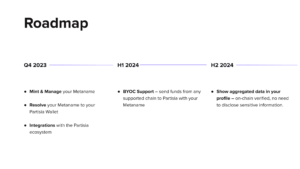
MetaNames aims not just to provide a base and core chain infrastructure but to fully leverage Partisia Blockchain’s innovative technology to improve the current NS industry.
Stay tuned for more, and keep up to date with us by following our Twitter!
Most may not know, but generating random numbers is hard. It is quite surprising because many people will think, “well, I can just come up with a random number off the top of my head!” However, randomly coming up with a number in your head, as well as other solutions to generate random numbers has fundamental flaws. And this is a big problem. Generating a fair unbiased random number is critical. In fact, random number generators are used everywhere.
The first place many would think of random numbers being useful is in games of chance. But would you be surprised if you knew that reading this article required the use of a random number generator? The website hosting this article is protected by a cryptographic key, which relies on generating a random set of values to be used for the encryption key.
Generating numbers at random is difficult. At a high level, there are two main issues with generating random numbers: predictability and bias/corruption issues.

The predictability issue for RNG can be seen in both human- and machine-generated random numbers. For example, there is a famous problem called Benford’s Law that states any random number that someone thinks about has a 30% chance of starting with the number 1. When you want to have a chance of a number being generated to be equal in percentage, then this becomes a problem. If you use a computer program to generate random numbers, you are using a structured code. This means, after multiple iterations, someone can reverse engineer the numbers to find the pattern and predict what the next number could be, especially if the code being used is weak.
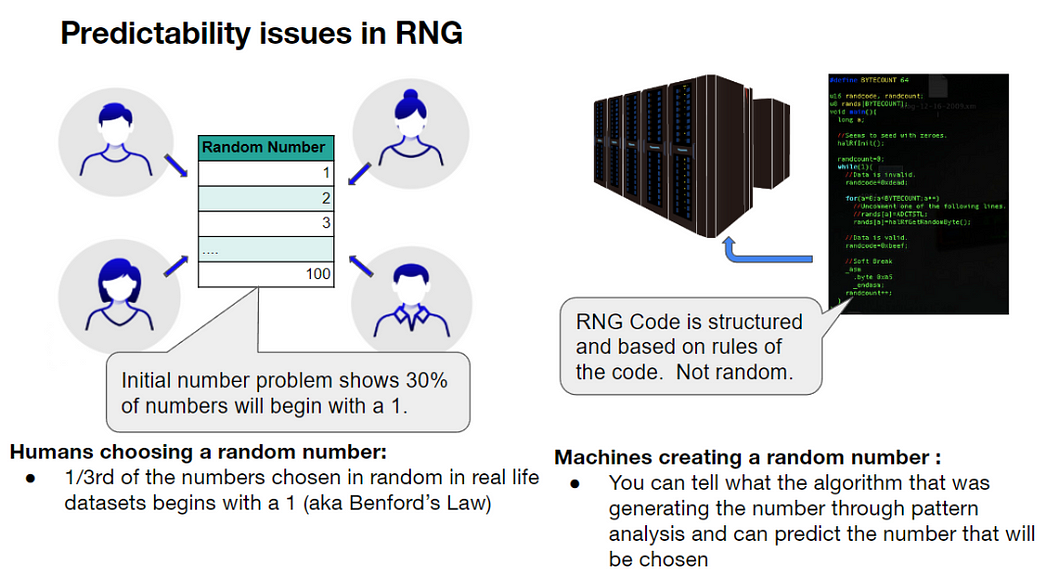
From a bias and corruption perspective, the current systems can also be gamed to give favor to someone. For instance, if a set group of people decide they will choose random numbers and run through some function to compute a random number, one person may withhold showing their number until they see what the other people have chosen. Then, once he knows the numbers of the other participants, he can choose a number that would compute the random number to his favor. From a machine generated random numbers, since most systems have a central system that is generating the numbers, anyone who has control of that system could also manipulate the numbers being generated to their favor.

So how can we create a system where it is both unpredictable and bias free? Through MPC and Partisia Blockchain, we can solve both problems. Through smart contracts, players in the system generate a random number. This random number is then privatized and sent into the PBC blockchain. A zero-knowledge computation is done, in a similar way as done through secret sharing and through a computation, a random number is revealed.

Through combining multiple players and secret sharing, developers can create a system to come up with a random number that is free from bias, incorruptible and impossible to predict. And Partisia Blockchain’s smart contract language will afford developers to customize this solution to their specific requirements.
By creating a programming language that allows for developers to use MPC in a generic way, Partisia Blockchain Foundation has made the creation of applications that can harness the power of MPC for different use cases a possibility. Partisia has been at the forefront of providing private MPC solutions since 2008. And by layering this technology on top of an interoperable and scalable blockchain, Partisia Blockchain is now paving the way for anyone to create solutions that can balance privacy and transparency to build trust.
To learn more about different use cases or partner with us for solutions, please visit partisiablockchain.com, check out our Medium articles, development documentations or email us at build@partisiablockchain.com.
In April 2023, Partisia Blockchain had an eventful month with exciting updates and developments. We welcomed Bakyt Azimkanov as the new Head of Communications, signaling a commitment to expanding its reach and global presence. The Spotlight Solutions campaign continued to showcase our MPC technology capabilities in enhancing security and trust in the blockchain industry. Partisia Hivemind Huddles was launched, providing a space for the community and team to discuss a variety of topics and encourage collaboration. And we distributed the third quarter staking rewards. Finally, we also shared several tech updates, including the launch of the ETH price oracle on testnet and the enabling of multiple inputs in an MPC contract, among other updates.
Last month, we were thrilled to share some exciting organizational highlights. Partisia Blockchain Foundation recently welcomed Bakyt Azimkanov as our new Head of Communications, marking a significant addition to our leadership team. Bakyt is an accomplished professional with years of experience in strategic communications, branding, and press outreach programs across blockchain, financial services, and technology. Before joining us, he served as the Head of Communications at the Cardano Foundation. In his new role, he will oversee the development and implementation of a comprehensive communication strategy aimed at increasing awareness and driving adoption of our blockchain technology with cutting-edge multiparty computation capabilities.
We were delighted to have Bakyt, along with another excellent addition to Tiago Serôdio, Head of Community, attend Consensus 2023 in Austin, Texas, to represent Partisia Blockchain. Our team was thrilled to meet new and old friends in the community and engage in fruitful discussions about the future of blockchain technology. We had a great time networking and learning about the latest trends and innovations in the industry and were delighted to see so much enthusiasm for our MPC blockchain technology. If you missed us at the event, please reach out to us and let’s connect. We look forward to seeing you at the next blockchain event.
Throughout April, we continued to highlight our Solutions Spotlight campaign, including Secret Surveys, Preventing Front Running, Privatized Settlement Layers, and Data Sharing showcasing how Partisia Blockchain’s MPC technology can enhance security and trust in the blockchain industry. Our Head of Community, Tiago Serôdio, and Head of Developer Relations, Bruce Ahn, led a series of Spotlight AMAs and Q&As to educate our community on how our MPC technology can solve real world problems.
Last month, we were thrilled to launch Partisia Hivemind Huddles! Our inaugural monthly Hivemind Huddle took place on Friday, 21 April 2023, providing a space for our community and team to come together and discuss a variety of topics, while encouraging everyone to participate with their ideas and thoughts. This informal and welcoming forum is designed to promote open communication and collaboration. For the first session, we focused on answering recent questions from our community through an AMA format. For those who could not attend, we will hold a second session that will recap the first session and address any follow-up questions. Stay tuned for updates on the next Hivemind Huddle, and mark your calendars to join us for lively discussions and brainstorming sessions.
Our ecosystem is growing! Our partners have been working hard and making progress building on our chain. Our sales team also has been busy and are working through more than 40 new leads and prospects. We have also seen higher interest in our blockchain and, as a result, have received multiple pitch ideas and we are busy working to get them onboarded and begin development. Please be on the lookout for our ecosystem spotlight in May for more details.
Third quarter rewards distributed. We have distributed our bootstrapping rewards for the third distribution quarter (December 2022 — February 2023). This is also our first distribution for our community stakers and more than 650,000 MPC tokens were distributed. Even better, we expect our next quarter rewards to be over one million! So, if you have not staked your tokens, please read this guide and put your tokens to work.
Website • Twitter • Discord • Telegram • LinkedIn • Facebook • Instagram • GitLab • Medium • YouTube
Trust is the basis for any relationship. Whether it is between you and your friends, or between one company working with another, even with governments sharing information with each other. Without trust, society cannot exist. Every type of a relationship requires some type of trust that is built through time.
But what is trust? And how does one go about establishing it with another entity? Trust is earned through a give-and-take between parties and demonstrated pattern of reliability. It is also relative, as everyone has a different level of risk appetite. A balance that is relative to the amount of risk the person is willing to take against the amount of reliability the other party has demonstrated in the past.
So how does this balance take place?
Clearly, if no one is willing to share or demonstrate anything about themselves, trust cannot be established. There has to be some level of vulnerability to even begin the initial stages of establishing trust. But at the same time, complete and full transparency also does not help establish trust. And this is because almost all relationships start off mutually distrustful. Trust is something earned. If given to someone arbitrary, that person could use that trust against you.
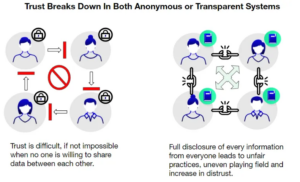
And in a way this balance of privacy and transparency to establish trust has been tipped in favor of one side to another throughout history. How many times have you or someone you know been burned by giving trust to someone who–knowingly or unknowingly–betrayed it? How many deals are broken between companies? How many government secrets have been compromised through leaks? Building trust is a gradual process, where one party shares something in hopes that the other party shares something of equal value.
But what if there was a way to share information without sharing information?
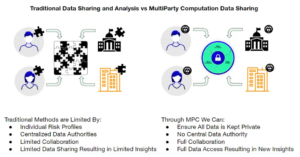
As we reviewed in other articles, multiparty computation allows for the computing of data even if the owner does not share the details around it. And in the example of sharing of data, this means any mutually distrustful parties can collectively allow the use of their data without sharing the details of data itself.
What does this mean in practice? At a high level, this means you can now reduce the weight of risk in the balance of establishing trust. Because you no longer have to expose your private data, the risk of that data being used against you is lowered. And this means you no longer require the same heavy weight for demonstrated reliability that you would need on the other side of the trust scale.
This is a game changer on many levels. Trust is the fundamental basis for any relationships between entities. With MPC, we now have the opportunity to change how this can be played.
In the example below, let’s say we have two financial companies that are competitors. They have a lot of secrets they would like to keep internal, but they do business with each other as a part of their overall practice. As a result of their business, there are many mutual clients. If there was a suspicious activity in one of their clients, having a single set of data they can analyze may not be enough. But what if both companies could share the use of their data together for forensic analysis without sharing the details of the data itself? This may lead to a far more comprehensive analysis.
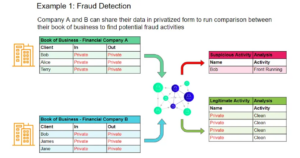
Another example is where multiple companies need to validate meeting of certain regulatory or compliance goals. But to compute the data, it requires exposing private information. Through MPC and Partisia Blockchain, a company will be able to validate meeting regulatory goals without exposing their data to the public.
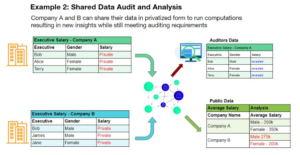
These are very simple examples of how companies can still work together without revealing their private data. And we have quite a variety of projects building on Partisia Blockchain that takes advantage of this new way of doing business.
CyberPeace Institute is working with Partisia Blockchain to help NGOs combat the issue of malware and ransomware by allowing NGOs to privately work with other parties who may be facing similar attacks. This allows NGOs to work together with others without reputation impact or exposing information that may create other vulnerabilities in their system.
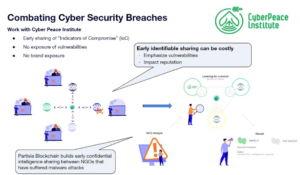
Monadi is working on helping companies comply with CSRD regulations that will impact over 50,000 companies in the EU. By 2025, companies will need to validate that they are meeting certain SDG goals, with the first goal being able to certify that there is no gender pay gap in their executives’ compensations. As the regulation matures, Monadi will be in a good position to help companies certify other SDG requirements without the need for the company to expose private data.
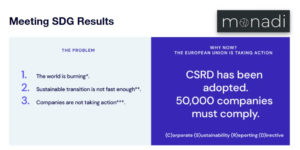
With a growing number of partners and integrators looking to solve the issue of trust, Partisia Blockchain is well positioned to help provide the solutions we need–whether it is to address the transparency in blockchains or to solve existing problems outside the blockchain space.
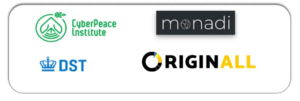
For additional insights on this use case, come and watch our Q&A session we did on this topic.
By creating a programming language that allows for developers to use MPC in a generic way, Partisia Blockchain Foundation has made the creation of applications that can harness the power of MPC for different use cases a possibility. Partisia has been at the forefront of providing private MPC solutions since 2008. And by layering this technology on top of an interoperable and scalable blockchain, Partisia Blockchain is now paving the way for anyone to create solutions that can balance privacy and transparency to build trust.
To learn more about different use cases or partner with us for solutions, please visit partisiablockchain.com, check out our Medium articles, development documentations or email us at build@partisiablockchain.com.
Ledgers are the primary ways settlements are recorded. The first double bookkeeping ledger system was recorded in use as far back as the 1300s. It is still the de-facto system used today to record transactions between entities.
Fast forward to 2008. Satoshi Nakamoto (pseudonym) was frustrated with the corruption due to the lack of transparency and centralized control of the traditional system. He proposed a transparent distributed ledger system that was immutable as a system of recording transactions. Thus Bitcoin was born.
But with all new systems, there is always room for improvements.
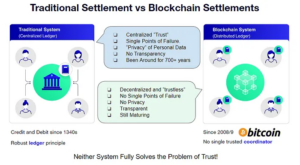
As discussed in our previous articles, full transparency does not solve the problem of building trust. In fact, privacy is a requirement in any trust relationship. For example, nobody would trust a credit card provider that revealed every purchase cardholders made just by someone having their credit card number. In a traditional blockchain space, every transaction is written in a public ledger. It would only require matching a wallet address to a name to see the full history of their transactions.
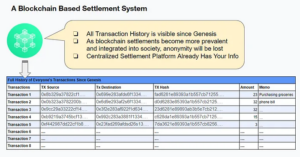
How can you have a blockchain that privatizes transactions and has enough flexibility to analyze and compute the data? Through integrating a proven technology into a scalable and interoperable blockchain.
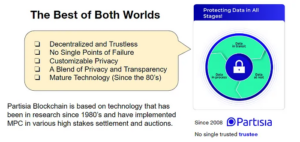
Developers can pick and choose which part of the data in the blockchain needs to be private and which can be public. All thanks to the Partisia Blockchain’s programmable MPC. A layer of governance can be enabled around the private data to allow for computation and access to select individuals. Those who access the data can also be audited transparently.
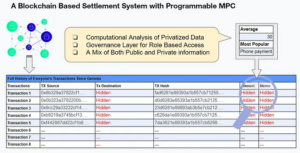
Now, even if someone has your credit card details, they will not be able to see your purchase history and your spending. If needed, a governance model can be created to ensure auditability and traceability to the system.
The importance is evident in our partnership with the International Committee of the Red Cross (ICRC). We partnered with the ICRC to build out a program for distributing aid through blockchain. One of their key requirements was privacy of the aid recipients. As they are a very unique organization, one of their key principles is in confidentiality and bilateral dialogue. The ICRC mainly operates in conflict zones and lack of privacy can mean life or death.
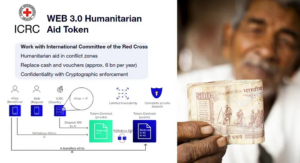
ICRC was able to solve their key challenge of privatizing the transactions of the stable tokens in the ecosystem thanks to Partisia Blockchain’s MPC. As shown above, the deposit of the funds from ICRC is kept private. As a result, transfers between the users are anonymous. To learn more, please watch our video of the overview of the solution here.
As blockchains become more prevalent, the need for privacy will continue to grow and take center stage. Various projects are already being built with private settlements in mind. We continue to speak with many organizations who prioritize the need for privacy in a blockchain solution.
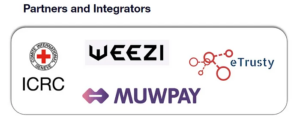
For additional insights on this use case, come and watch our Q&A session we did on this topic.
By creating a programming language that allows for developers to use MPC in a generic way, Partisia Blockchain Foundation has made the creation of applications that can harness the power of MPC for different use cases a possibility. Partisia has been at the forefront of providing private MPC solutions since 2008. And by layering this technology on top of an interoperable and scalable blockchain, Partisia Blockchain is now paving the way for anyone to create solutions that can balance privacy and transparency to build trust.
To learn more about different use cases or partner with us for solutions, please visit partisiablockchain.com, check out our Medium articles, development documentations or email me at bruce.ahn@partisiablockchain.com.
ZÜRICH, 12 April 2023. Partisia Blockchain Foundation proudly announces the appointment of Bakyt Azimkanov, an accomplished and award-winning professional, as the Head of Communications, effective immediately. This strategic hire supports the organization’s expansion plans and underscores its commitment to increasing its voice and raising its awareness worldwide.
A former Head of Communications at the Cardano Foundation, Bakyt joins the organization with decades of experience in strategic communications, integrated public relations campaigns, branding, and press outreach programs across blockchain, financial services, and technology.
In his new role, Bakyt will develop and oversee the implementation of a communications strategy to raise Partisia Blockchain Foundation’s profile and drive adoption of the fourth generation blockchain, which features unparalleled multiparty computation technology.
As a trusted counselor to the leadership team, Bakyt will provide expert advice on unified communications initiatives to increase awareness and share of voice. He will also advise on leadership positioning strategy, execution tactics, and implementation methodology.
Kurt Nielsen, President of Partisia Blockchain Foundation, expressed his excitement for the appointment, saying, “We are thrilled to enlist the rich expertise and visionary leadership of Bakyt, who boasts a remarkable array of proficiencies and extensive experience in steering value-driven purpose-led communications initiatives. We are confident that his unique skill set will be instrumental in bolstering the standing of Partisia Blockchain within the global blockchain arena. With unwavering conviction, we anticipate his invaluable contributions in advancing our ethos and perpetual metamorphic objectives.”
Before joining Partisia Blockchain Foundation, Bakyt held numerous senior leadership positions at major global organizations, including leading transformational programs at the Cardano Foundation. He led its positioning overhaul, ICAD-nominated brand refresh and built its brand, marketing, community management and communications functions.
Outside the blockchain industry, Bakyt previously led the global media relations and social media at EY (Ernst & Young), a professional services organization, focusing on strategy and transactions, namely mergers and acquisitions, divestments, and private equity, where he played a pivotal role in securing and maintaining a number one share of voice in the media. Bakyt is also one of the founding partners of Syyx, a Web3 full-suite marketing and communications boutique set up by former Cardano leaders.
Bakyt is a trained journalist with a Master of Arts degree in Business and Finance Journalism from City University (United Kingdom), a second Master of Arts degree in Media Studies and Communication from the University of Aarhus (Denmark), and a Bachelor of Arts degree in Journalism and Public Relations from the American University of Central Asia (Kyrgyz Republic).
Partisia Blockchain Foundation is honored to welcome Bakyt Azimkanov to its leadership team and looks forward to his contribution in elevating the company’s communications function to new heights.
About Partisia Blockchain Foundation: Partisia Blockchain Foundation brings unparalleled opportunities by empowering privacy-preserving, interoperable and sustainable innovation for fairness and transparency. It fuels the most secure and efficient networks to solve global problems. Distilled with more than 30 years of rigorous research, Partisia Blockchain future-proofs solutions, solves tomorrow’s challenges by powering fair, secure, distribution of benefits. While preserving privacy and confidentiality, it brings accountable, transparent and decentralized governance. Learn more: www.PartisiaBlockchain.com
Stay updated: Website • Twitter • Discord • Telegram • LinkedIn • Facebook • Instagram • GitLab • Medium • YouTube
In a traditional asset trading platform, front running is defined as the illegal practice of placing a trade based on advanced non-public knowledge of an upcoming trade which can impact prices. As shown in the example below, a broker can take advantage of a situation when he or she gets a large order by one of their clients. Since they know this order will impact the price of the asset, they place their own personal order ahead of their client’s order. Then, they place the client order, raising the stock price. Once this is done they will sell their own shares to profit off their clients order.
Another term used often is insider trading, which is based on a very similar practice of using information only they have access to in order to gain an unfair advantage over others.
In the Web3 space, everything is transparent and, ironically, revealing too much information can also create these situations. An example of this is front running on a decentralized exchange (dex) that you may have already heard of. This type of a front running is possible through the combination of having total transparency in the blockchain along with how Ethereum (and many other blockchains) prioritize transactions in a node’s mempool.
In this particular example, an attacker (usually a bot) scans the mempool to see a particular scenario that they can take advantage of. Scanning the mempool, they look for an opportunity to insert in a bid at a lower price but higher gas than another large bid already in the mempool.
Once their bid completes, they wait for the larger order to go through, raising the price of the asset. Then they place a sell order at a higher price than the buy order he placed ahead of the larger order, and pockets the difference. All this is happening in a blink of an eye, making it impossible for any normal person to be able to recognize they are being taken advantage of.
But what if we could make the orders private? This prevents the attacker from being able to read the auction details in the mempool, and making the bot unable to identify a situation to take advantage of.
Through multiparty computation (MPC), details can be kept private while still computing the winner. In the situation of this dex, the results of the prices are not revealed until the bids are completed, ensuring that attackers cannot gain any advantageous information ahead of time.
The team in Partisia has already provided solutions to solve this issue in multiple scenarios. From governments to OTC trading platforms, they have been trusted to run high stakes auctions in different levels and through enabling this technology on a blockchain, we are giving everyone the power to solve the problem of ensuring integrity in the bidding process.
For additional insights on this use case, we recommend viewing our Q&A session on this topic.
By creating a programming language that allows for developers to use MPC in a generic way, Partisia Blockchain Foundation has made the creation of applications that can harness the power of MPC for different use cases a possibility. Partisia has been at the forefront of providing private MPC solutions since 2008. And by layering this technology on top of an interoperable and scalable blockchain, Partisia Blockchain is now paving the way for anyone to create solutions that can balance privacy and transparency to build trust.
To learn more about different use cases or partner with us for solutions, please visit partisiablockchain.com, check out our Medium articles, development documentations or email me at bruce.ahn@partisiablockchain.com
Your opinion matters. It matters so much that the global online data market estimate is to be over US$270 billion dollars, all focused around buying and selling of your data to the highest bidders. It is a very complex web of transactions that ferry your data from one place to another and many times, your data is used in ways you never realized could be used for. From Cambridge Analytics’ controversial use of data to TikTok’s alleged aggressive data harvesting, there is a large market for your information and how it is used is very unclear.
The current Web2 market for surveys is in the exchange of your data. This means your opinion is collected, filtered, analyzed, sold and bought. The data may be collected anonymously, or it may be tied to your identity. Either way, this data is collected and managed by a centralized system, which has control over the data they purchased. There is also the ever growing concern of bots and AI scripts that automate and duplicate fake data leading to data integrity issues.

One of the ways a decentralized blockchain can help change the landscape of the survey market is through dissolving the centralized control problem. Because the data can be made public, and with no single point of control of the data, you can be sure that the data can reside on-chain and has no central ownership or control. However, this can create problems with privacy. All data is now public and this creates two issues.
A unified public and private smart contract, like the one Partisia Blockchain supports, enables the best of both worlds and solves the two issues above, where you now have a decentralized blockchain that eliminates any controlling entity while still being able to privatize your data. Not only does this retain the data marketplace but redefines it in a way where the user now has control over the data.

The online survey industry is large and is continuously growing. And this is because surveys hold a lot of valuable data. As reviewed in our earlier article on privatized voting, we use multiparty computation (MPC) on the blockchain to hide your data on-chain, but still allow for computing of the data.

While the private voting use case reviewed a very simple computation on who the winner of an election was, Partisia Blockchain’s programming language allows full algebraic equations to be used to calculate any number of computations using the hidden data. This means not only being able to compute on a single category, but also combine results of the computation from multiple categories.

This change in privacy of your survey data creates a new change in how the data marketplace can be viewed. By allowing the survey participants ownership of their data, but still allowing for the computation of it, the marketplace of the data has now shifted from buying and selling of your data to buying and selling of the “use of your data”. You now still hold ownership of the data and you are now selling the use of your data while still keeping your data private. This paradigm shift creates new opportunities for a different marketplace where you are not just selling your data one time, but rather allow for the possibility of both updating of the data in real time as well as being rewarded each time your data is used. And through privatized authentication, the data quality improves as well leading to better accurate analysis.

For additional insights on this use case, we recommend viewing our Q&A session.
By creating a programming language that allows for developers to use MPC in a generic way, Partisia Blockchain has made the creation of applications that can harness the power of MPC for different use cases a possibility. Partisia has been at the forefront of providing private MPC solutions since 2008. And by layering this technology on top of an interoperable and scalable blockchain, Partisia Blockchain is now paving the way for anyone to create solutions that can balance privacy and transparency to build trust.
To learn more about different use cases or partner with us for solutions, please visit partisiablockchain.com, check out our Medium articles, development documentations or email us at build@partisiablockchain.com.
As the first quarter of 2023 draws to a close, Partisia Blockchain is celebrating a successful start to the year. Our team participated in the renowned Paris Blockchain Week, where we showcased our latest solutions, including our revolutionary private voting technology. Additionally, we celebrated International Women’s Day with our Paris Hackathon winner, Thousand Faces, a community-driven investment platform that provides inclusion and accessibility for female and diverse founders. We are committed to supporting Thousand Faces’ goals and are thrilled to witness our network being utilized to address societal challenges. We also welcomed our new Head of Community, Tiago Serôdio, who will provide expert guidance on scaling and diversifying our community. At Partisia Blockchain, we remain committed to driving innovation, empowering our community, and delivering cutting-edge solutions.
We are delighted to announce the appointment of Tiago Serôdio as the Head of Community at Partisia Blockchain. With over 10 years of experience in building and running communities, Tiago’s appointment underlines our commitment to engaging our community and achieving our growth objectives. He brings a wealth of expertise in marketing campaigns and community management from his notable work at Cardano. We are excited to have Tiago on board and look forward to collaborating with him to scale and diversify our community. Additionally, we are thrilled to share that our team and collective skillset is expanding, with more Web3 professionals set to join. Stay tuned for more updates!
First and foremost, we were happy to meet our community members in Paris at the end of the month. Visitors of our booth during the Paris Blockchain Week were treated to exclusive merchandise and met with our delegation. Our community members were very supportive and active during the voting for the inaugural Paris Blockchain Week Awards. This afforded us to showcase one of our key solutions — private voting. Thousands have cast their votes and had an opportunity to experience our zero-knowledge voting. Therefore, we start our Solutions Spotlight campaign with a focus on private voting. Each week we will highlight one of our solutions and our new Head of Community, Tiago Serôdio, will lead a series of Spotlight AMAs and Q&As. The first one took place on 30 March 2023 focusing on private voting. The next ones will focus on secret surveys (6 April 2023), front running (13 April 2023) and privatized settlement layer (20 April 2023). Stay tuned!
In March, development work was mostly focused on improvements to key infrastructure functions. From fixing bugs to improving various invocations, we have been continuing to improve upon existing functionality.
In April, we plan to launch our first version of our Eth pricing Oracle on our testnet. This is an important milestone for our mainnet where BYOC transfers will now accurately reflect actual prices. This will both benefit our node operators to get more accurate fee distributions on their BYOC rewards, as well as allow for more accurate transferability on our Hermes bridge.
Website • Twitter • Discord • Telegram • LinkedIn • Facebook • Instagram • GitLab • Medium • YouTube
The shortest month of the year was a time of steady progress. The first voting on blockchain being the highlight, updates to our staking tools were also February’s highlights. Team members from Denmark, Germany, Portugal, Switzerland, US and the United Arab Emirates convened in Aarhus for a strategic sprint meeting. In-person gathering in Central Jutland took the pulse of the current progress to date against the roadmap, outlined the plans for the remainder of the year and finalized the near-term strategy of key functions. Stay tuned for exciting new developments and be the first to know.
The first-ever voting on Partisia blockchain went live in February. The inaugural voting on our blockchain is the first of many applications of our technology. This vote showcases the untapped potential of the secure, transparent and privacy-preserving ZK technology for voting. We teamed up with the Paris Blockchain Week to power their début Awards in selecting the crème de la crème of the blockchain industry. The voting is on Parti.com, a unique social network run on our blockchain. Voting on blockchain allows users to securely vote on chain utilizing our tamper-proof technology.
Users can cast their votes for their nominee in each category, except People’s Choice Award and Prix du Jury, until 23 March 2023. The Award ceremony at the Carrousel du Louvre will take place on the last day of the Paris Blockchain Week. The Partisia Blockchain team will be in the French capital attending Europe’s largest blockchain industry gathering. We will be announcing a few things on the ground. So, rendez-vous à Paris during 21–23 March 2023!
As we welcome the spring, we will be also initiating a few community initiatives in March and rolling out various programs. We hope to involve our community regularly and host regular Q&A sessions, attend community-led meet-ups and introduce incentives. More details will come during this spring.
Last month, we released version 2 of our staking site. As part of the revamp, we released browser.partisiablockchain.com alongside a major change. This allows the community to stake both locked and unlocked tokens. In this release, we also updated our staking instructions and held two AMAs (instructions and reward model).
In the age of GDPR and tighter regulatory environment, we continue to show our leadership in the compliance space by launching jurisdiction management to ZK smart contracts. This allows developers control over where in the world the secret data of your contracts reside, ensuring your business can meet regulatory requirements even in the blockchain space.
In testnet, transferability of BYOC as well as MPC tokens are now enabled. Now you will be able to create contracts for transferring assets across accounts. You can also begin testing our unique swap capabilities on our testnet. We highly encourage all developers to try this out.
In the node community news, we made improvements in the BPOC contract. Active committee members, which were dropped due to server issues during a new committee vote process, now can re-enter the committee the following month without the need for a new committee vote.
Website • Twitter • Discord • Telegram • LinkedIn • Facebook • Instagram • GitLab • Medium • YouTube
Hello Partisians,
We had an amazing January to start the year 2022 and are proud to share some of the big updates here with you today.
Last week, we added another 64 block producers to the network, bringing the network to 128 global validators. At the time of writing, Partisia Blockchain mainnet beta has finalized 452,927 transactions across three shards. The network run time has been 100% with zero outages. This is a major accomplishment and we’re excited to add another node operator committee and stress test the network during February 2022.
On 27 January 2023, Partisia Blockchain Co-Founders Kurt Nielsen, Peter Frandsen, and Brian Gallagher hosted the first ever video AMA for the Node Operators. It started with a thorough presentation from Kurt regarding the different nodes the network can run, the built in incentives, and near time road map. After the presentation, the team answered questions from the community.
The much anticipated public sale details are finally coming together! As the official mainnet genesis block is currently planned for March, the public sale will occur shortly after. There are a few variables to consider regarding the actual mainnet launch time and the Foundation remains flexible on the exact launch date based on the following:
Public Sale Platform: Partisia Blockchain will host its own public sale on our own platform. You must complete kyc.partisiablockchain.com to be eligible for the sale. Beware of any fake sales or scam attempts. The sale will be conducted from the official partisiablockchain.com website and nowhere else.
Price: US$0.40/MPC token
Vesting: Two-year quarterly unlock starting at TGE
Sale Quantity: Limited- minimum cap US$5 million, maximum cap US$40 million.
Our Twitter account was verified with a blue check mark by Twitter. This is quite an accomplishment for such an early stage project to get that type of recognition. Please make sure to give us a follow on Twitter if you have not already done so.
Over the course of the next week, we will begin to open source some of our libraries and launch bug bounty campaigns with our partner Immunefi. The details of this campaign will come in a separate blog post.
We have opened a new, official YouTube account and produced a short film showcasing our project. Be one of the first viewers here:
We have launched our official discord channel! Here is an invite link for you to join and get integrated into our bustling community: https://discord.gg/JEx7H8XY
It is going to be a high stakes month during February as we test our infrastructure with open source bug bounty campaigns. Beyond that, we are growing our community. With the new discord server now in operation, we plan to onboard tens of thousands of new users to the community this month. Please get involved by joining the Discord. You can also expect another AMA and more video content.
Partisia Blockchain Team
Website • Twitter • Discord • Telegram • LinkedIn • Facebook • Instagram • GitLab • Medium • YouTube
Partisia Blockchain’s privacy-preserving technologies support the ICRC in providing humanitarian aid to global crisis zones.
On December 2, 2022, at our first Hackathon (the “PartiHack”) in Paris, France, Partisia Blockchain and the International Committee of the Red Cross (ICRC) announced our partnership to harness blockchain-based technology to enable aid distribution to global crisis zones in a way that is more efficient and safer for recipients. We were proud to be able to present the working prototype of this system and to demonstrate how this technology could be used in conflict zones to ensure a high degree of privacy and data protection for relief distributions.
This amazing collaboration offers a vision of a better mechanism for providing assistance to those most vulnerable to armed conflict and violence around the world. The stablecoin we are developing in partnership with the ICRC could pilot a new way of providing support to these victims by combining the advantages of public blockchains with the privacy protections of Partisia Blockchain’s advanced multi-party computation technology.
We are incredibly excited to begin applying Partisia Blockchain’s leading technologies to create a pioneering solution with the ICRC to explore and research how humanitarian cash and voucher assistance programs can benefit from our technology. This is a breakthrough in the real-world use cases of our blockchain.
The current partnership provides a key example of the power of Partisia Blockchain’s singularly scalable, privacy-protecting, multi-party computation technology. This model, first discussed at TOKEN2049 in Singapore, also served as a key source of inspiration for developers participating in Partisia’s Hackathon, which awarded several significant grants to projects judged among the best submissions.
More on those here!
Stay updated: Website • X • Discord • Telegram • LinkedIn • Facebook • Instagram • GitLab • Medium • YouTube
There are 7 proprietary innovations that deliver Partisia Blockchain’s complete Layer 1+2 Blockchain. In this blog, we present the final and the seventh innovative feature — market for trust — we call it Mithra.
For an overview of all of the 7 features see the Zeus blog. We present each of the 7 innovations with a unique post leading up to TGE on May 31, 2022.
As any decentralized network, Partisia Blockchain relies on efficient node operators and no dominating numbers of malicious nodes. To grow a strong network of highly trusted efficient nodes, the Partisia Blockchain will gradually evolve into a market for trust — a market that rewards nodes that efficiently validate and propagate information and run zero-knowledge computation and token bridges trusted by the users.
The first part of the market for trust is to incentivize good performance by the individual nodes running basic blockchain services. This covers P2P propagation of information, validation and execution of transactions. The initial incentive provision will adjust the simple proportional reward sharing with direct observable measures such as the number of blocks produced as Sequencer. This rewards the best nodes performing the very basic operation as Sequencer. This basic incentive provision will be extended with an advanced incentive scheme that rewards nodes for revealing the otherwise hidden activities in the P2P network. The collected information is made public and used to reward the nodes that are the most active propagators of information in the P2P network. The intuition for this model is illustrated below.
The second part of the market for trust focuses on the ZK and Oracle services that are operated by subsets of ZK and Oracle nodes. As the network of ZK Oracle nodes grows the users will be able to impact the selection nodes for zero-knowledge computation and token bridges. This selection process will gradually involve a market where quality is rewarded and the most trusted nodes will be paid a higher price for the services performed.
In conclusion, on one hand, the basic blockchain involving all baker nodes is incentivized through relative performance and local information in the P2P network. On the other hand, the services performed by subsets of nodes are incentivized through competition driven by the users. In combination, this two-sided incentive provision sets a new standard for how to incentivize a decentralized network by creating a comprehensive and transparent market for trust for the greater good.
For more details, please check out the yellow paper, software documentation and the Medium blogs.
This concludes the blog series that briefly introduced the 7 main features defining the Partisia Blockchain mainnet, called ZEUS:
Poseidon — Provable Fast Track Consensus
Hermes — Collateralized Token Bridging
Apollo — Unified Public and Private Smart Contracts
Mithra — Market for Trust
Please let us know what you think and thank you to everyone in our community for your support!
There are 7 proprietary innovations that deliver Partisia Blockchain’s complete Layer 1+2 Blockchain. In this blog we present the sixth innovative feature — public and private smart contracts — we call it Apollo.
For an overview of all of the 7 features see the Zeus blog here. We are presenting each of the 7 innovations with a unique post to explain each feature.
Smart contracts are programs stored and executed on the blockchain. The automated execution of smart contracts based on predefined conditions is a significant part of the value proposition from the blockchain ecosystem in general. Today this kind of tailored services are managed by third parties in control of the users’ data — a situation that created the current internet economy or web 2.0 with large information giants.
The privacy-preserving computations built into the Partisia Blockchain add an essential dimension to smart contracts. With general privacy-preserving computation, smart contract automation enables a data driven economy with private digital agents that remain in full control of the private data involved. This is a new way forward for the internet economy with the users in control of their own data and hence their own bargaining power.
To realize this vision, the smart contracts on Partisia Blockchain are designed for general coordination of public and private computations — a unified public and private smart contract language. A very significant innovation is the private smart contracts that makes it simple for any developer to tap into zero-knowledge computation or MPC-as-a-Service. As MPC is a very advanced technology — it is an explicit goal that the expertise and knowhow of the Partisia expert team will be gradually built into the smart contract language. This will ensure the uptake of an otherwise complex technology and enable efficient execution and avoid security breaches.
We believe that general privacy-preserving computation and our private smart contract language will move the blockchain ecosystem to a new level and open up for an entire new field of use cases.
The smart contracts will enable users to take advantage of the full stack that has been designed to bring privacy to all platforms. The scalability provided by Poseidon and Iris enable efficient zero-knowledge computation and the Bring Your Own Coin (BYOC) provided by Hermes ensures economic alignment with the networks that integrate with Partisia Blockchain.
For more details, please checkout the yellow paper and software documentation.
Please let us know what you think and stay tuned for the next blog post about the market for trust, called Mithra.
Thank you to everyone in our community for your support!
Partisia Blockchain Team
There are 7 proprietary innovations that deliver Partisia Blockchain’s complete Layer 1+2 Blockchain. In this blog we present the fifth innovative feature — MPC-as-a-Service — we call it Demeter.
For an overview of all of the 7 features see the Zeus blog. We present each of the 7 innovations with a unique post leading up to TGE on May 31, 2022.
The single most important contribution of the Partisia Blockchain project is to bring general privacy-preserving computation to blockchain and most notably Secure Multiparty Computation (MPC). MPC is a revolutionary technology that allows us to protect our data, not only when they are being stored or communicated, but also while they are being processed.
Using Secure Multiparty Computation, individuals and organizations can allow their private data to be used for a certain purpose, while retaining complete control over the data. One example is a new type of “data exchange” where the data owners remain in control of their data and where only the result of privacy-preserving computation is shared or exchanged. This allows citizens to participate in continuous assessment of healthcare treatment or for competing companies to share best practice for the greater good. Another example is financial markets, where private order books can be matched continuously and only matching trades executed. These are just two examples of services already developed and tested in real life — we believe that the Partisia Blockchain dApps ecosystem will reveal the true power of MPC-as-a-Service as a core part of WEB 3.0.
To be secure and efficient, MPC requires participation of multiple parties that share the computational work to be done. This avoids having to trust any single party, but also leads to practical challenges related to coordination of the computing parties and managing the communication with the data owners.
This is why the entire Partisia Blockchain is designed for secure and efficient orchestration of MPC-as-a-Service. The team behind the project has pioneered MPC and delivered commercial grade MPC since 2008. Partisia Blockchain is probably the most ambitious MPC platform and it comes with an extensive set of tools and a new set of MPC protocols called REAL. A core feature is efficient preprocessing that utilizes all the blockchain orchestration of many nodes to the fullest extent to speed up realtime use of MPC. We call this Demeter MPC-as-a-Service and claim that we set a new standard for how to conduct any type of privacy-preserving computations within and beyond the blockchain ecosystem.
For more details, please checkout the yellow paper, software documentation and the Medium blogs.
Please let us know what you think and stay tuned for the next blog post about the unified public and private smart contracts, called Apollo.
Thank you to everyone in our community for your support!
Partisia Blockchain Team
There are 7 proprietary innovations that deliver Partisia Blockchain’s complete Layer 1+2 Blockchain. In this blog we present the fourth innovative feature — the zero-knowledge layer — we call it Athena.
For an overview of all of the 7 features see the Zeus blog. We present each of the 7 innovations with a unique post leading up to TGE on May 31, 2022.
“The lack of confidentiality and privacy on blockchains is obvious and hampers their uptake and use”. This is the first line of the white paper and the starting point of the Partisia Blockchain as the project is all about bringing privacy to blockchain.
Current mainstream blockchain technology provides full transparency about transactions and a pseudonymized representation of the users. Adding privacy in terms of “private transactions” to this mainstream blockchain model is challenging as one cannot both have private transactions and be anonymous. Another often overlooked problem is the privacy problem around the data used prior to a transaction as opposed to the transaction itself. As an example, it may require the use of private data across hundreds of potential buyers and sellers to get to a single transaction. Providing privacy to this part is what has the potential to turn the current business model in the internet economy upside down and put the user back in control of their own data.
The Partisia Blockchain is designed to bring privacy to blockchain in a regulatory compliant and flexible way. The basic design choice is to build privacy on top of a transparent mainstream blockchain model. This allows us to design a highly efficient and scalable consensus and execution laid out in the Poseidon and Iris blog. Privacy-preserving computation is added as a service on top of the basic blockchain. From an application developer’s or designer’s point of view, this allows for any arbitrary mix of transparency and privacy. The privacy-preserving computation makes it even possible to add privacy to the extent needed — and you can even have complete privacy. As an example of this, consider a dApp with its own private transactions built on the Partisia Blockchain, this way any audit request can be done with privacy-preserving computation and the transactions can remain private in a regulatory compliant way.
The privacy-preserving computation is provided and operated exclusively by accredited ZK nodes in known jurisdictions. This further enables dApps to be regulatory compliant with data protection regulation like GDPR for two main reasons:
Hereby, Partisia Blockchain enable basic GDPR requirements like the “Right to privacy” (Data is kept private in all stages: at rest, in transit and process) and “Right to be forgotten” (Data is used ad hoc and the encrypted data used in zero-knowledge computations are deleted after use).
For more details, please checkout the yellow paper and software documentation.
Please let us know what you think and stay tuned for the next blog post about MPC-As-A-Service, called Demeter.
Thank you to everyone in our community for your support!
Partisia Blockchain Team